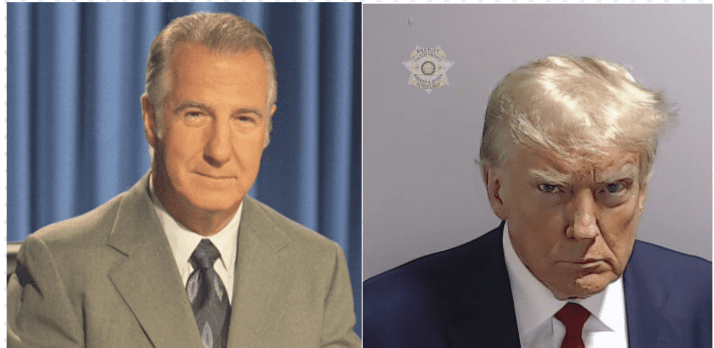Witcover on Politics: The Stain of Indictment, from Agnew to Trump
By • September 5, 2023 0 1699

Fierce partisan division is underway within the Republican Party over the recent indictments of former President Donald Trump on numerous charges. He’s been implicated for federal election obstruction, mishandling classified documents, falsifying business records, and racketeering. His blatantly aggressive mug shot from his Georgia District Attorney’s criminal conspiracy case against him has wrought a political firestorm.
I remember another similar firestorm during the 1970s, when beleaguered Vice President Spiro T. Agnew and his three lawyers negotiated one of the biggest plea-bargaining deals in U.S. history. He was indicted for taking bribes and conspiring against the U.S. government. Agnew, like Trump, symbolized the aspirations and prejudices of a broad segment of American society. After his indictment, however, he became persona non grata.
At the White House, Agnew presented his resignation to President Richard M. Nixon. “As I was leaving,” he later recalled, “Nixon put his arm around my shoulders, shook his head, and said again how awful it all was. Incongruously, I suddenly had the feeling he couldn’t wait to get me out of there.”
This does not seem to be the case with Donald Trump, whose followers have rejoiced over his infamous mug shot on T-shirts selling for his legal defense, and whose fellow Republicans have said they would still endorse as a Presidential candidate even if he is convicted.
It is a commentary on the American political system that such figures as Spiro Agnew or Donald Trump can flourish, and whose election into public office and subsequent momentous decisions can so influence the directions of our lives.
Critics are focusing on the 14th Amendment to the U.S. Constitution which provides that no person shall be elected president who is guilty of having engaged in an act of political subversion against the United States.
Even so, the temperament of the country today is very different from the 1970s. As I write this, Trump has already raised over $7 million for his 2024 reelection campaign since his mugshot was released in Georgia. By contrast, after the resignations of Agnew and Nixon from public office, neither one was ever invited to attend, let alone speak, at any of their party’s national conventions. Through it all, the indicted Agnew remained a hounded man.
My last personal encounter with Agnew came some years later, when I spied him at a table with friends, later identified as old Secret Service agents, at a restaurant in a downtown Washington hotel near my old stomping grounds at The Washington Post. I walked over and, admittedly somewhat mischievously, proposed that I write another book telling his side of the resignation story. He later said: “I burst out laughing every time I think of that incident. After dipping his pen in poison to write two books about me, Witcover had the nerve to ask me to help him write another!”
I took that as a “No.”
Jules Witcover is the author of twenty books on U.S. politics.

